#studying Japanese
Text
Learn japanese by watching anime with JPN Subtitles! ( . u . )
Today, out of the blue, I remembered a site I had discovered a couple of years ago - AniMelon!
I had been searching for a place to watch anime with japanese subtitles - for if the subs are English, I rely on them too much.
However, animelon is run for people who are trying to learn japanese, thus one can freely set what kind of subtitles they want!
I usually have JPN - fontsize roughly 56, and english, on a fontsize of 38, in a somewhat darker shade.
However, one may also enable Romaji, or Hiragana / Katakana as well - there's tons of customization options!


I customized my subs so I can read the eng subs if I need them - but they dont stand out / are a bit harder to read, so my brain won't auto-read them, when I'm looking at the JPN subtitles.
The JPN Subtitles help a lot to fill the gaps if something slips my comprehension - plus, thanks to browser extentions I can simply hover over the JPN Subs & with merely a single click anki will create a new vocab card for me. ( . u . )
I figured this site might be helpful for some, so i wanted to share it!
Using netflix is an option as well, but since you need a) a Netflix Subscription and b) a VPN to access Japanese Media I feel its ways less accessible than, well, this free option . u . )
#studyblr#langblr#study#studying#study motivation#japanese#learn japanese#study japanese#studying japanese#japanese langblr#language immersion#immersion#foreign language
280 notes
·
View notes
Text
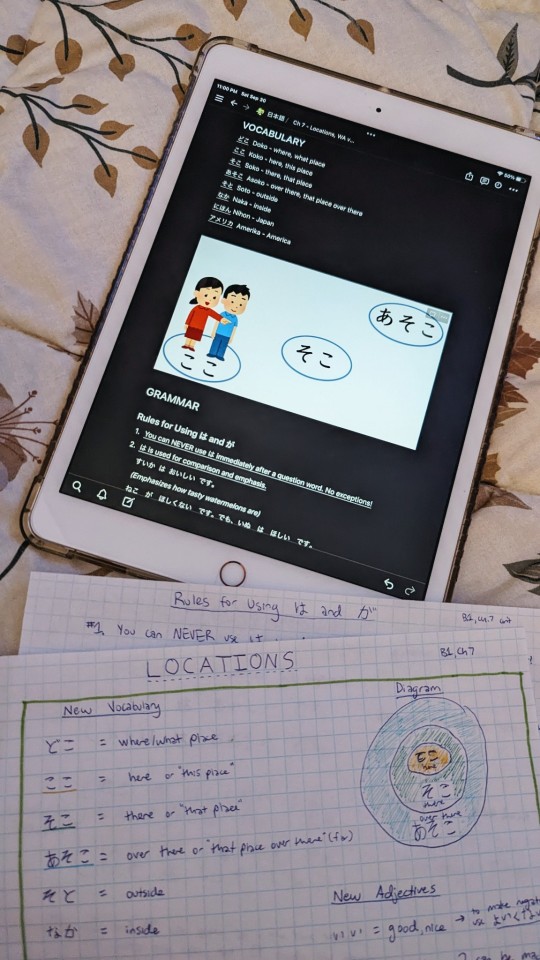
Transferring my messy handwritten notes to Notion so I can always access them 📑
Aaand suddenly it's 11 o'clock which is two hours past my bedtime YIKES (I'm old)
#study#studyblr#langblr#studying languages#learning Japanese#studying Japanese#nihongo#hiragana#grammar study#messy notes#messy handwriting#handwritten notes#digital notes#Notion#study time#never stop learning#japanese language
28 notes
·
View notes
Text
JLPT N5 - くなる and くする
This grammar point is very simple. You use くなる when the condition of something becomes a certain way by itself. On the other hand, くする is used when the condition of something is changed by an outside agent (either a person or a thing). In this post, let’s look at these two very basic constructions and how the Japanese works.
Here is your vocabulary:

【The Grammar】
The grammar is very simple. First, you take an adjective or a noun and change them to their adverbial forms. For example, the adjective 長い has an adverbial form of 長く. The noun ひま has an adverbial form of ひまに.
After you make the adverbial forms of the adjective or the noun, you just put it before either なる or する. That’s it!
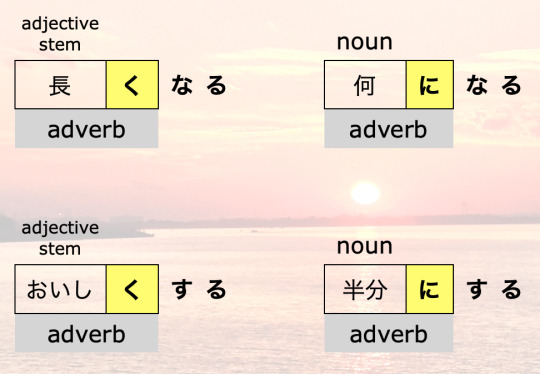
We talked about the く connector in this post and about the adverbial に in this post.
I should point out that while this grammar point appears in most JLPT books and websites as くなる and くする, as you can see in the picture above, nouns don’t use く! For that reason, I choose to call this point adverb ✙ なる and adverb ✙ する.
【adverb + なる】
Here are some examples with なる:
① 熱が下がって、気分がだいぶ{よくなりました}。
=fever will go down and then feeling became considerably better
= My fever went down and then I felt much better.
② この仕事が終わったら、少し{ひまになる}と思います。
= when work finishes, a little bit, will become free, I think
= I think that when work finishes, I’ll have more time.
③ このごろ仕事が減って、前ほど{忙しくなくなった}。
= these days, work decreased and so as much as before, became not busy
= These days, I have less work and so I’m not as busy as before.
④ きみは{大人になったら}、{何になりたい}の。
= when you become an adult, what want to become
= When you grow up, what do you want to be (and explain)?
Some things to notice:
In example 1, the sense is that when the fever went down, the person’s mood got better by itself.
In example 2, the condition of having more free time arises naturally when work decreases. (ひま can have the connotation of having absolutely nothing to do and can be considered rude by some people. I use the word for myself sometimes, but I never seriously refer to other people as ひま.)
Concerning example 3, the negative form of 忙しい is with 忙しくない. If you want to make THAT into an adverb, it will become 忙しくなく. This was very difficult for me when I was just beginning Japanese.
Finally, Example 4 shows that the question word of 何 can be treated as a noun. This makes sense if you think of it as a placeholder for whatever answer the listener will give. Also, because the speaker uses the word きみ we know that the speaker and listener are close. It would make sense if it were a parent-child relationship. きみ is NOT used with people that you have just met or that you don’t know well!
【adverb + する】
Here are some examples with する:
⑤(父が子どもに)もっと部屋を{きれいにしなさい}。
= father to his child: a little bit more the room, make it clean
= Clean up your room a bit more.
⑥ このケーキ、ちょっと大きいから、{半分にして}ください。
= this cake, a bit big and so make it half please
= This cake is a bit (too) big so please cut it in half.
⑦ スカートを5センチぐらい{短かくして}ください。
= this skirt, about 5 centimeters make it short please
= Please shorten this skirt about 5 centimeters.
Notice that examples 5, 6 and 7 all include someone (other than the speaker) making a thing (a room, a cake, and a skirt) a different condition than the current one. This is when you will want to use adverb + する.
【Conclusion】
The grammar points of adverb ✙ なる and adverb ✙ する are pretty simple to understand. That is why they are considered Level N5. Adverb ✙ なる shows a person or a thing becoming a different condition by itself. Adverb ✙ する shows a person or a thing changing to a different condition by a different person or thing.
Thanks for reading, and see you next time!
Rice & Peace,
– AL (アル)
👋🏾
#japanese#japanese grammar#learn japanese#japanese language#japanese lesson#japanese study#japanese vocabulary#japanese vocab#japanese verbs#studying Japanese#japaneselessons#learnjapanese#japanese studyblr#japanese langblr#JLPT#JLPT N5#jlptn5#にほんご#日本語#日本語の勉強#一緒日本語#language#languages#language study#language studyblr#language blr#IsshoNihongo
388 notes
·
View notes
Note
hi hi :D how are youu fellow sns truther and aspiring japanese learner (I have tried several times already but alas) on this fine day??
I'm doing good, thank you :D Today I'll reach 14 days of learning japanese, and it's been so much fun!
My favorite sentence I've learned this far is げっこうです、キスするのは女性だけ" which means "no, thank you, I only kiss women" (at least that's what google translator says, I know it's not the most reliable source) This sentence is a priority because when you're a feminine lesbian you have to say things like that at least once a day lol
And still pretty much obsessed with my sasunaru playlist I made the other day, it's good to daydream about these idiot homosexuals in music videos. Also, if you have a good naruto x sasuke fanfic recommendation, please let me know!
11 notes
·
View notes
Text
Happy Tanabata Festivall🎋✨
Today it’s the 7th of 7th which is a magical day filled with love and miracles.
The number 7 is considered to be the number of spiritual perfection because it’s a symbol of God’s work.
It’s a symbol of completeness and heaven.

Today we are celebrating the meeting of the deities Orihime and Hikoboshi, represented by the stars Vega and Altair.
Princess Orihime was a beautiful seamstress who wove gorgeous clothes by the Heavenly River, represented by the Milky way. Princess Orihime was so engaged with her work, she became despaired of ever finding her true love. Her father, a God of the Heavens, the Emperor of the Galaxy, loved her dearly and arranged for her to meet the lovely Hikoboshi, the cow herder who lived on the other side of the Heavenly River. It was love at first sight and they got married right away.
Their love and devotion to each other was so deep that Princess Orihime stopped weaving and Hikoboshi allowed his cows to wander the Heavens.
The Emperor became so angry that he forbade the two lovers to be together, sending Hikoboshi to the other side of the Milky Way.
Beside herself with loneliness, Princess Orihime cried and cried. Beginning the rainy season with her tears.
The Emperor couldn’t stand to see his daughter in this state, so he allowed her to visit her dearest Hikoboshi one day a year, the 7th of the 7th.
This legend is known as Tanabata 七夕 meaning “Evening of the Sevens” also know as Hoshi Matsuri 星祭り meaning Star Festival.
It originally comes from the Chinese Qixi Festival 七夕节 which is the 7th of 7th from the Lunar calendar. It was brought to Japan during the 8th century.
To honor the Star Crossed Lovers people write their wishes on colourful thin strips of paper called tanzaku 短冊紙 and hang them from bamboo branches.
I hope you enjoyed this story.
Have a lovely day and may all of your beautiful wishes come true! 💋💖✨
#tanabata#star festival#七夕#星祭り#hoshi matsuri#tanzaku#nihongo#studying japanese#expatlife#life in japan#日本語
26 notes
·
View notes
Text
Hello everyone! Welcome to my japanese learning diary!
Some ground facts: I've been studying Japanese on and off for a long long period of time with varying success. Finally last December I hit my first measurable goal. I passed the N5! (Very much unofficially with an app- mind you)
I was happy with my success and made a plan to pass the N4 in the next 3-4 months and the N3 around this time next year. These were vague goals I hadn't committed to very much. However as I shared these plans my friend laughed at me and told me there was no way I could do it. So me, being a reasonable adult absolutely ignored his opinion and continued on my merry way happily.
Who am I kidding? I took offence and upped my arrogance x100. One thing led to another and we now have a gamble going. According to that I absolutely must pass by February 12th 2024.
It has been a couple of days and to answer the question of do I regret this? Absolutely. But I'm a woman of my word and this is now a thing that will happen. Come hell or high water.
Currently my study plan is to study vocab, kanji and grammar in renshuu. I'm also reading a small picture book a day at tadoku.org as well as listening to beginner podcasts. I'm also watching japanese gaming streams but to be completely honest my understanding of them is less than 10% and mostly I do it for fun. Let's just call it passive learning :D
I'm a big fan of statistics so I'll share some here.

These are my current renshuu stats. 1075 words, 117 kanji and 63... grammar? I don't think they are seperate grammar points. To be completely honest with you I've no idea what this means.
To compare to what you need to know for N3
~650 kanji
~3750 vocab words
So im around a 4th or 5th of the way there. It will be a long journey ahead. Possible? Yes absolutely. Lots of hard work, long hours and frustration? Also yes. Absolutely.
But with this said I'm off to wrestle my daily reviews into submission! Thank you for reading and if you are interested in seeing where this journey will end up in make sure to hit that follow button!
#japanese learning#first post#japanese studyblr#japanese study#jlptn5#jlptn3#jlpt n5#jlpt n3#japanese learning blog#daily japanese#studying japanese#japaneae study plan
30 notes
·
View notes
Text
Grammar
~はそれほど好きではありません
それほど: not so much
好きではありません: I don't like
~~~~~~~~~~~~~~~~~~~~~~~~~~~~~~~~~~~~~~~~
漢字はそれほど好きではありません
I don't like kanji that much.
39 notes
·
View notes
Text

Is there anywhere I can go to either make a friend or just talk to someone that knows or is learning Japanese? Maybe via discord or something?
#ミミが話す#learning Japanese#studying Japanese#study#Japanese#Japan#Japanese language#Nihongo#日本語#discord#tumblr
5 notes
·
View notes
Text
こんにちは、テイです!
アリオンは私の彼女です、彼は私の一番好きな人!
かれはノンバイナリ人です
彼の方が私より背が高い。かれも顔が丸くてかわいいんですよ。
彼は髪が長いんです。
性格の中で、彼女はのんびりしていて、気が長くて気が強いですが彼も短気ですよ。
私の方が彼女より年上ですが私たち大学生です。大学のクラブで会いました。初めに、彼女は私の���の友達でしたそして彼は私の友達になりました。
私の彼女を愛してるよ!
#japan#japanese#japanese language#japanese langblr#nihongo#learning japanese#studying Japanese#polyglot#foreign languages#japanese practice
2 notes
·
View notes
Text
₊✩‧₊˚౨ৎ˚₊✩‧₊
hi !!
大家好 !
안녕~
おっす ~ !
₊✩‧₊˚౨ৎ˚₊✩‧₊
what i do in my free time:
write fics
listen to music while writing fics
read fics
talk about the fics i read
fantasize about the fics i haven't written yet
₊✩‧₊˚౨ৎ˚₊✩‧₊
blink, neverland, wiz*one, midzy, once, teleposse, bunny, my, dive, kkoti, nswer, jigumi, stay, glassy, army, bullet, nctzen, reveluv, orbit and fearnot
₊✩‧₊˚౨ৎ˚₊✩‧₊
i mostly write for idle and itzy, but trying to write others too ~
₊✩‧₊˚౨ৎ˚₊✩‧₊
#writing#writer#fanfiction writers#a03 writer#wattpad writer#blackpink#(g)i-dle#iz*one#itzy#twice#newjeans#aespa#ive#chuu#nmixx#yena#straykids#skz#jo yuri#bibi#nct127#nct#nct u#nct dream#le sserafim#studying korean#studying japanese#studying mandarin chinese#studying english#red velvet
3 notes
·
View notes
Text
Studying Japanese? Pt 2
This is only my only personal opinion. It worked for me and I just wanted to share.
Create a goal within a time frame.
Ex: At the end of 2022, I have learnt 2000 kanjis.
I want to pass JLPT N3.
You need to know where you are. What level of Japanese proficiency are you on. Take any online tests, and it should tell you roughly which level are you on.
Learn what type of learner are you. Visual, auditory, tactile or a mix? What time of the day are you most energetic? At night? During the day? Early morning? You sacrifice something to learn a new language.
Buy an offline dictionary/ download an online dictionary.
For ios, I use Shirabe Jisho.
Find good textbooks online/ physical text books. I'm using Try! JLPT N1 with English notes. Gotta research to make sure your money is worth it. Refer here for a reddit thread on textbooks.
Find the time to study according your study method.
Divide the session to learn on kanjis, vocabulary, grammar and speaking/ pronunciation.
- For kanji, learn from a list. Use Kanji apps (refer here for some recommendations, remember to try and error because what works for everyone does not mean it will work for you). Find the meaning of the radicals. Search 'kanji + wanikani' to learn the mnemonics for the kanji. Use flashcard apps like Anki or create your own physical flashcards.
- For vocabulary, prepare a small book to compile your vocabularies in. Read short newspapers online, articles in Japanese that you may be interested in. Watch shows with Japanese subtitles (use this Language Reactor extension, so you can learn a new word straight away from the subtitle) or listen to podcasts, and list down new words each day. Draw three columns.
[ Word - meaning (in your native language) - example of a word ]
- For grammar, use your textbook. To get more detailed explanation regarding a grammar, type 'the grammar that you are learning + Maggie sensei/ JLPT sensei/文法' These sites will explain more in detail and provide you with example sentences.
- For speaking/ pronunciation/ listening, I use HelloTalk. I meet with people online to listen to them speaking. Just beware of disclosing personal informations online.
Discipline and consistency matters. No matter how shitty you feel/ how dumb you feel for not understanding something in Japanese-- Take only 5 minutes to learn for that day. Just 5 minutes. Continue if you feel like it, or just stop and continue your language study for the next day.
So this is it. I wish everyone of you all the best! Maybe you can make mastering Japanese as a New Year's resolution? It's never too late to start on something.
#learn japanese#learning kanji#study tips#studying#japanese#japanese langblr#japanese language#studying japanese
15 notes
·
View notes
Text
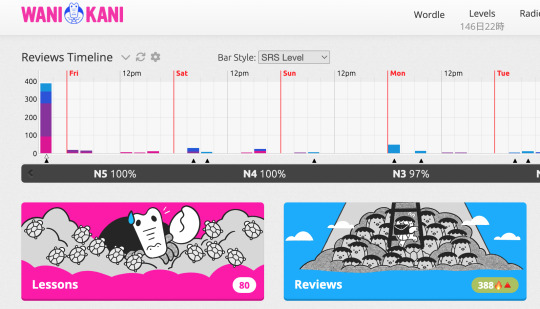
this year has been very tricky in terms of studying Japanese. working alongside on my first feature documentary film as an editor, getting a Bachelor of Arts and starting my Masters right after that has made it so there's little time and energy left for studying (which I do as a hobby)
I've been stuck on level 38 in Wanikani for a big chunk of the year and I can't dig myself out of the hundreds of reviews. in a way I'm getting the best deal out of my lifetime subscription now lol
that said, tonight I'm trying my best to go down to at least 299. wish me luck!
2 notes
·
View notes
Text


30.8.22 || Japanese notes
Hello everyone! It’s been a while since I’ve updated this blog and even longer for adding to the studyblr. So here we are with some Japanese notes for my upcoming writing test. Took the liberty to go to a cafe and study for a little and it was really nice change of pace. And I actually got a lot of work done so a very successful day I would say. Romanticising studying actually is really fun to do ^^
And ofc I won’t forget the song playlist:
Only Then - Jungkook (cover)
Old Love - Yuji ft Putri Dahlia
Snowfall - Oneheart
Prelude: Seesaw (+instrumental) - MDP (cover)
#aesthetic#study#studyspo#study motivation#studying#studying japanese#japanese studyspo#japanese studyblr#study japanese#learning japanese#japanese#japanese notes#studyblr#langauge learning#aesthetic notes#romanticism#romantisize study#language study#language#japan#study set up#study session#study aesthetic#cafe study#warmth
33 notes
·
View notes
Text
14.4) Conditional Forms (と)
The last conditional form we will talk about is the conditional と particle. First though, it’s important to distinguish between this usage and other usages of the と particle. Just like に and で, there are many ways you will see/hear the conditional と used!
Below are 6 sentences that use the と particle, but NOT the conditional と.
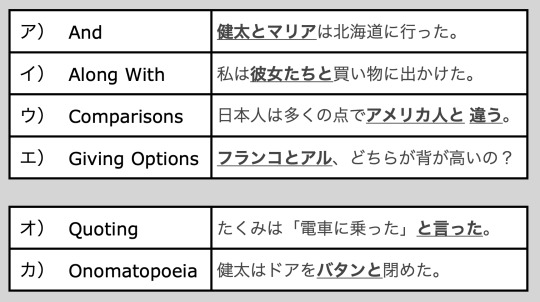
If you want to read about these uses, check out these posts I made about them:
【Examples ア-エ】
【Examples オ and カ】
Also, I already wrote a post about the conditional と particle that you can read here. In this post I’m going to be looking at conditional と in a different way. Here is your vocabulary:
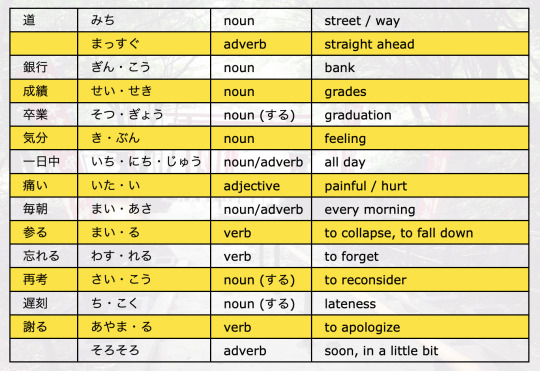
【The Grammar of と】
The conditional と particle can attach to verbs, adjectives and noun-copula pairs (but only in the form of noun+だ).

【Did It Happen Or Not?】
When you look at sentences with the conditional と, there are two possibilities when it comes to the second clause:

If we think of this with English counterparts, here are two examples:
[Case1] When / If water reaches 100℃, it boils.
[Case2] When I walked in the room, the students stopped talking.
In case 1, the event in the first clause (water reaching 100℃) inevitably leads to the event in the second clause (it boiling). That is to say, the second clause hasn’t actually happened yet... but if the first clause happens, it will.
Compare that to case 2, where both events have already happened. This is a big difference between the two cases. Now, here are some Japanese examples:
①{この道をまっすぐ行くと}、{銀行があります}。
= when/if the/this street go straight, there will be a bank
= When/if you go straight down this street, there will be a bank.
②{成績が悪いと}、{学校を卒業できないよ}。
= when/if grades are bad, can’t graduate from school, you know
= When/if your grades are bad, you can’t graduate.
③{学校に行くと}{休みだった}。
= when go to school, it was rest
= When I went to school, it was closed.
【The Timing of と】
Another thing to think about when using the conditional と is the timing of the events. と gives the nuance that both happen almost at the same time.
④{天気がいいと}{気分がいい}。
= when/if the weather is good, feel good
= I feel good when/if the weather is good.
Example 4 is saying that the weather being good directly leads to the speaker also feeling good. The nuance of the timing is that as soon as or soon after the weather is good, the speaker feels good. Sometimes, this means that you can translate the と as “once”.
We will come back to this idea of timing when we compare the conditional forms. 😉
【When or If?】
In general, if the second clause is in past form, the English translation will use “when”.
Here are two more examples:
⑤ 一日中{パソコンを使うと}、{目が痛くなります}。
= all day when/if use a computer, eyes hurt
= When / If I use the computer all day, my eyes hurt.
⑥ 毎朝{起きると}{コーヒーを飲む}。
= every day when wake up, drink coffee
= Every day when I wake up, I drink coffee.
For example 5, there won’t be a difference if you think of the と as “if” or as “when”. However, there is a HUGE difference between “when I wake up” and “if I wake up”! This shows that the action or adjective in the first clause is the key to the English translation. Some words will naturally translate to “if”, and some words will naturally translate to “when”. Many words though, can use either and make sense.
【〜ないと】
The last thing we should talk about is the “warning” usage of conditional と. Because the conditional と expresses a natural consequence or an inevitability, it is often attached to the negative form of a verb in order to warn the listener of some... negative consequence. An extension of this is indicating the speaker’s responsibility or duty to do something.
There are three kinds of clauses you will see / hear after a ないと clause: (1) a grammatically positive phrase with a negative meaning or (2) a grammatically negative phrase with a negative meaning. Here are some examples:
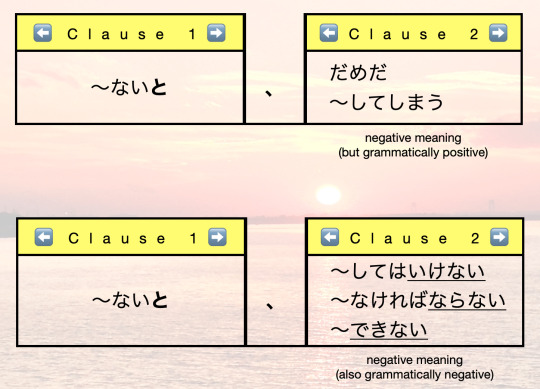
だめ simply means “it’s not good”.
〜してしまう has a nuance of something unexpected happening. For example if you use the verb 参る with しまう, you get 参ってしまう which means “unexpectedly collapse or fall down”.
〜してはいけない is a roundabout way of saying “don’t do 〜”. For example if you use the verb 忘れる in this construction you get 忘れてはいけない. This basically means “don’t forget”.
〜なければならない means “have to do 〜”. If you use the word 再考する in this construction, you will get 再考しなければならない。This means “have to reconsider”.
Finally, 〜できない means “can’t do 〜”
Here are some examples with Japanese sentences:
⑦{早く起きないと}{遅刻するよ}。
= in an early way, if don’t get up, will do lateness
= If I don’t get up early, I’ll be late!
⑧{アンに謝らないと}{いけない}。
= to Ann, if I don’t apologize, it won’t go/do
= I have to apologize to Ann.
Notice how clause 2 in example 7 is grammatically positive (遅刻する) but has a negative meaning. On the other hand, clause 2 in example 8 is negative (いけない) and also has a negative meaning. This is something you will see quite often after a ないと phrase.
The third possibility for what comes after a ないと clause is... nothing! Japanese often avoids being direct by simply not saying a phrase or a word. With ないと clauses, everyone knows that the following clause is something negative so it’s ok to just not say anything. The listener or reader can use their imagination to figure out the negative consequence(s). Here is an example:
⑨{そろそろ寝ないと}。
= well... soon if don’t sleep...
= Well... I need to sleep soon.
First off, we don’t actually know who the subject is in example 9 but we can assume that it is the speaker though. The speaker intentionally leaves off the second clause. We don’t actually know what will happen if he/she doesn’t sleep but because of the ないと, we know it won’t be good!
【Conclusion】
And that is what you should know about using the conditional と. I hope this post was helpful and informative. As always, if you have any questions, let me know!
The next post will be the last one in this conditional forms section, so look out for that. Good luck with your Japanese learning adventure!
Rice & Peace,
– AL (アル)
👋🏾
#japanese#japanese grammar#learn japanese#japanese language#japanese lesson#japanese study#japanese vocabulary#japanese vocab#japanese verbs#studying Japanese#japanese particles#japaneselessons#japanese langblr#learnjapanese#japanese studyblr#japanese conjunctions#japanese conditionals#language#languages#language study#language studyblr#language blr#日本語#日本語の勉強#一緒日本語#IsshoNihongo
154 notes
·
View notes
Text
I did a search and verified that followers of my main blog shouldn't be getting spammed by my secondary blog, but if anyone following my main blog is seeing this please let me so I can look into it.
I finished practice section 1 parts A, B, and C. I first used the app to go over the sections with an audio component, speaking the parts outloud, then I went back and wrote the answers down. I'm struggling a but more with the pronunciation of the negative form of the adjectives than the affirmative form. I also need to circle back to the sentences as there are couple things that I'm not sure are right - e.g. I'm not sure I can use ときどき that way and I think I might need to use いる with クラス instead of ある. I doubt anyone but me is reading this, but I'm open to gentle correction from anyone who knows better.
My handwriting in Japanese isn't great, but it's not great in English either so it's kind of to be expected 😅

#personal japanese study log#cresneta studies japanese#genki 1 chapter 5#日本語を勉強します#studying japanese
4 notes
·
View notes
Text
the stages of grief studying japanese
denial
you're bright-eyed, young, and motivated. you're learning a new language! a new world is opening up to you, for sure!
despair
despite getting better and better everyday, it just broadens the horizon of everything you don't know yet (unknown kanji, absurd abbreviations in spoken language, archaic grammar that for some mysterious reason is sticking around to taunt you)
bargaining
why couldn't you be interested in any other country? maybe one of the romance languages that comes more easily to you? or scandinavian? or maybe even mandarin, at least there's only one reading to the kanji there for fuck's sake. is it too late for a career change?
pride
people often say "that looks so HARD, i could NEVER". usually, you're humble and patiently explain what kind of work goes into it. you're slowly becoming too proud of yourself. "hm, yes, it's a really hard language", you say. "one of the hardest in the world, actually." but, your japanese friends tell you, how much better you got, so you're clearly a natural at studying japanese now.
hubris
you're getting really good at this, huh? why not pick up another east-asian language? you already know how to differentiate kanji, so mandarin shouldn't be so hard. or korean, the grammar's similar, isn't it? should be easy. walk in the park.
(currently in all stages at once, tbh.)
4 notes
·
View notes